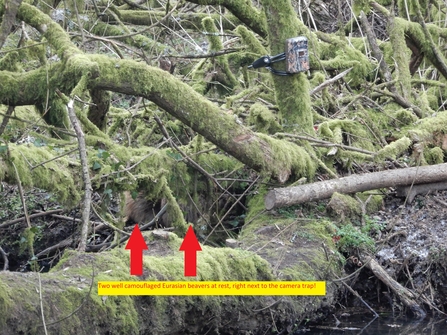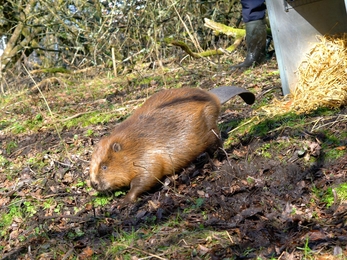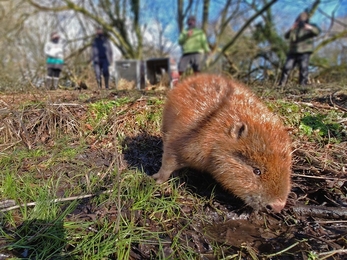I have had the absolute privilege of observing two of Dorset’s most talked about new residents settle into their new surroundings, having been safely relocated to our project site from Scotland. The release of the two animals was an idyllic and incredibly peaceful event, as they calmly set foot into their new freshwater habitat, oblivious to their importance, initially wading gracefully out across muddy terrain (in which we would have disappeared!) before finding deeper water and taking a first swim in their new home. Funnily enough, the male and female beaver then headed in totally separate directions, but their exploration had begun, and we left them to it. As you can imagine, I was incredibly keen to see the pair settle in quickly, and with various checks required, I had the honour of quietly visiting the site every day for the first week. I did not necessarily expect to see the animals themselves due to the complexity of the freshwater habitat that they now found themselves in and their mostly nocturnal activities, but I wanted to see signs that they were ok.
Checking the specially deployed camera traps was my best bet and as I eagerly crept in the direction of the first camera for my first check, I could not believe what I saw next. Not only could I see the camera but to my amazement, both beavers were huddled together at the foot of the tree on which it was attached. You could not make it up! A quick scan through my binoculars and with the pair oblivious to my presence, I turned around and left them to their secluded resting place undisturbed, happy in the knowledge that they were safe and well.

Steve Oliver
Since that magical encounter I am extremely pleased to report that the pair have been exhibiting normal beaver behaviour from the word go and have taken no time at all in making their home in their new surroundings. Astonishingly, these industrious mammals started constructing their first dam on the third night of being on site – now that is what I call settling in quickly!
How do beavers impact the environment?
Amidst an ecological and climate crisis, there is growing evidence that these magnificent creatures have the potential to bring multiple benefits to a landscape, including biodiversity gains. Beavers have the ability to change a landscape like nothing else (apart from maybe humans!). A beaver’s presence and its unique habits have the potential to create a rough and complex wetland landscape within a river catchment, and this is incredibly exciting. Wetlands are one of our most threatened habitats, but where land and water mix, wildlife can thrive and create truly magical places where we ourselves can be inspired by nature.
Steve Oliver
On our scientific project site, we are busy working in partnership with Exeter University and Wessex Water to collect data, with water quality, water flow and biodiversity changes all being carefully monitored. This local project is the perfect opportunity to engage with people about the potential benefits beavers can bring to our environment as well as addressing possible management issues, and increasing our awareness, and understanding of what it means to live alongside beavers in our landscape once again.
The Dorset Wildlife Trust Beaver Project team are excited to bring you more news of the beavers, their habits, dams and all our other findings as this scientific project unfolds. We look forward to keeping you updated through the months to come….
Beavers need a safe return to the wild
The Government has launched a public consultation for a national beaver strategy and we need your support for an ambitious plan that will see beavers reach their potential to restore our rivers and wetlands for the benefit of local people and wildlife. The Wildlife Trusts want to see:
- Beavers formally recognised as a resident species in England
- Beaver populations helped to thrive in the wild through ambitious and carefully targeted reintroduction projects
- Financial incentives to help landowners make space for watercourses and wetlands created by beavers on their land
- A management framework in place to ensure beavers are properly protected, making sure any problems can be dealt with quickly and effectively with expert support
- Local beaver management groups supported to deliver information, advice and assistance so that communities can continue to live happily alongside beavers



